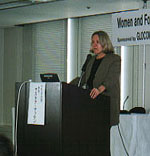Tokyo Forum on Women and Foreign Nationals in Information Society
The following is a summary of the keynote speech by Professor Saskia Sassen at the Tokyo Forum on October 16, 2001
Women and Information Technologies
Saskia Sassen (Ralph Lewis Professor of Sociology, University of Chicago and Centennial Visiting Professor, London School of Economics)
 When we think about the subject of women and information technologies, we need to introduce at least two important points. One of them is that the world of information technologies is not simply a neutral, technological world. It is a world inflected, inscribed and shaped by non-technological events, i.e., by larger social structures, values, objectives, agendas, etc. When it comes to the question of women and information technologies, immediately the issue of gendering comes up. The positioning of women vis-à-vis the question of information technologies is in some ways very different from that of men and in another ways exactly the same. So it is not just simple gendering. It is messy and multiple. When we think about the subject of women and information technologies, we need to introduce at least two important points. One of them is that the world of information technologies is not simply a neutral, technological world. It is a world inflected, inscribed and shaped by non-technological events, i.e., by larger social structures, values, objectives, agendas, etc. When it comes to the question of women and information technologies, immediately the issue of gendering comes up. The positioning of women vis-à-vis the question of information technologies is in some ways very different from that of men and in another ways exactly the same. So it is not just simple gendering. It is messy and multiple.
The second point that we need to bring into the picture is something that I call "mediating practices." I think that there is an intermediate zone between the technology and the individual. And that in between zone is a zone with particular cultures and societal venues where individuals are positioned differently in that society. The connection between cyberspace and individuals is constituted in terms of these mediating cultures.
When we are trying to address the question of women, the fact of gendering immediately jumps at us, and the notion would be that in both of these elements-- both the notion that cyberspace is embedded and these mediating cultures--the question of gendering is operative.
When we look at the literature about women and information technologies, we can think about four kinds of subjects that have been covered by the research; (1) Impact of new technologies on female-typed jobs; (2) Women's professional opportunities, especially entrepreneurship; (3) Women's time, especially in household work; and (4) More theoretical accounts about cyberspace and subjectivity. Of these four areas, entrepreneurship seems most promising.
Besides the question of entrepreneurship, there is a way once you recognize that the connection between the woman as a user and cyberspace is not a simple matter of accessing the hardware. There is actually an intermediate zone that is ambiguous and charged by the kinds of subcultures within which individuals dwell. What we find is that there is a whole world of cyberspace that is really women's world for good or for bad. It is a way of being present in cyberspace, and it is a way of using these technologies, producing a very strong women's presence in terms of websites, i.e., those by professional women in IT that are addressing issues on their own.
 I would like to interpret this in positive terms, and say that there is a form of distinctive leadership involved in this kind of work as well. Rather than looking at it in terms of "here comes gendering," I look at it as something that signals the possibility of new types of leadership, which may have been present for a long time, but in very obscure and invisible settings (i.e., the household, the neighborhood, the block, or the street where you live on), and now are relocated into a space which is a global space, where women from other similar situations can hook into as well. I would like to interpret this in positive terms, and say that there is a form of distinctive leadership involved in this kind of work as well. Rather than looking at it in terms of "here comes gendering," I look at it as something that signals the possibility of new types of leadership, which may have been present for a long time, but in very obscure and invisible settings (i.e., the household, the neighborhood, the block, or the street where you live on), and now are relocated into a space which is a global space, where women from other similar situations can hook into as well.
This is a way of signaling to women in other cultures that this reality exists. So there is the beginning of micro-politics that might well be far more significant than it looks right now. And it is, moreover, micro-politics characterized by the fact that it is about local, very specific issues, but connects to many, many other such local specific issues coming from other countries, from other groups of women, and hence become something different from where it has started out. And I see in this enormous enablement for women.
Let me give you an example that illustrates my last point. There are women who are fighting for housing in their slums, fighting with their local governments about that housing. They succeeded in developing strategies that are enormously successful, and began to share those strategies with women in Taipei, with women in Seoul, with women in Bangkok. And those women again engaged in this particular struggle with local governments about their local conditions, and jumped to Johannesberg, another city in South Africa, where there are many slums and many women in slums, and jumped to Quito in Equador with similar things. What you have here are multiple localized political projects enacted by women, the poorest of all women, who because they locate their particular struggle on the Internet gain power, gain clout, and gain energy. Even though their struggle is a local struggle, this cyberspace here functions as a space that enables women to transcend confinements of locality and to gain power from each other.
So I conclude now that when I look at the evidence, I see two areas where new information technologies are producing new types of leadership among women. One of them is entrepreneurship, all kinds of entrepreneurship in many specialized occupations. And the second one is in this kind of politics, which is global politics, but constituted in terms of very localized projects. It scales both at the global level, thanks to information technologies, and at very localized, often domestic projects and efforts by these women.
So the future looks rather interesting. We as women can expand the mediating cultures, and there are enormous opportunities. Although there are many negative conditions and we cannot be simply optimistic, there are very interesting opportunities for women to emerge as leaders.
Related Materials:
Table 1: Percentage of Male and Female Internet Users
Table 2: Women Start-Ups-Owned and Operated
Table 3: "FUBU" Women-Oriented Websites
Table 4: Technology and Women-Oriented Email Listserves
|





